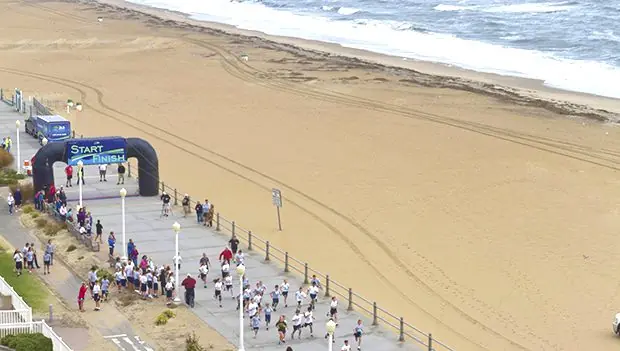
The right training fuel helps you feel your best, doesn't cause an upset stomach and promotes steady energy. While that sounds imple enough, it can actually take months or even years for some athletes to dial in to their favorite fuel for before, duringand after any training, event or race.
Once you get a hang of it, you think you're set. Until you have a destination event.
Traveling can throw a challenging wrench into even your best-laid plans. You usually have at least one day of car or airplane travel and restaurant or convenience store food before your event. And then, there's the night-before meal, and the morning of.
While it is a challenge, it's not impossible to stick to your plan and go into your race feeling well-fueled and ready. Having an eatingplan can reduce anxiety and allow for a calm, relaxing evening and morning before your race.
Here are some tips to help you dial in traveling training fuel.
Travel Day:
1. Don't let your travel day turn into an all-you-can-eat grazing buffet in your car. For some reason, road trips often turn into snack-a-thons. Instead, eat as you normally do. Stick to your regular meals and snacks, with breaks of not eating in between; hormone and blood sugar cycles do well with eating and not eating, rather than constant grazing.
2. Snacks: Generally, it's hard to find good-quality snacks on the road or in airports, so try packing your own. In the car, a small cooler can allow you to snack on yogurt, cheese and fruit. Nuts, whole-food bars and carrot or celery sticks are also easily packable.
3. Hydrate well, as traveling often tends to dehydrate athletes. It may be the often hectic schedule that makes you so busy you simply do not drink and fuel properly. It may also be changing climates, the dry airplane air or the airline fluid restrictions.
It's likely a combination of all of these. Whatever the culprit, make it a point to carry fluids with you as much as possible and hydrate well. It also helps to add electrolytes to your fluids the day before, so take along easy-to-carry electrolyte tablets and throw those in 1 to 2 servings of fluids.
Dinner Before the Event:
4. If possible, scope out dinner options ahead of time and find something suitable in advance. If you don't, and you're tired from travel, late getting into town or don't know your way around, you may have to settle for fast food or something that won't agree with you on race day.
5. Keep dinner simple. You need easy-to-digest foods that you know don't upset your stomach. Lean proteins such as chicken, whole-food carbohydrates such as rice, yams, sourdough breads or whole-grain pastas, and low-fiber vegetables such as green leaves, carrots and tomatoes are all good choices. If you're carbo -loading, you can easily add a banana or two from a convenience store or grocer.
Morning of the Race:
6. It's crucial that your pre-event fuel is a tried-and-true option that has been tested in training. There's often anxiety, sleeplessness and tight schedules the morning of an event or race, so don't complicate things by failing to plan your breakfast. When you consume carbohydrates in the hours before an event, those carbs can be used as fuel that promotes better performance (carbs are needed directly before and during exercise lasting greater than 2 hours). Here are a few easy options available most anywhere that will provide 75-100 grams of get-you-going carbohydrates:
1-1.5 cups cooked oatmeal with brown sugar, real maple or honey, nuts and a banana (instant oatmeal packets work well)
2 slices sourdough bread (or bagel) with a small amount of cream cheese or peanut butter, honey and a banana
1-2 hardboiled eggs, 1 cup rice (or 2 slices toast with honey or jam), salt or soy sauce
Pre-made smoothie: If you like liquid nutrition before an event (this is a personal favorite and choice for many), you can simply make it ahead of time and keep it in a cooler while traveling. Use fruit, yogurt, cooked rice, honey and blend well.
No blender, no cooler, smoothie-shake option: Combine 1.5-2 cups cherry juice (or juice from another fruit), 4 teaspoons beet powder, protein powder and water (optional). Shake well.
7. Remember to hydrate well before your event. Again, electrolyte drinks or tablets are a good idea the morning of, as extra sodium can increase your blood volume and reduce your risk of hyponatremia during your event. Have electrolyte options on hand so that you're not scrambling.
Camping Considerations: Many off-road athletes end up camping before a race and have to work with minimal cooking equipment. This presents an extra degree of difficulty. I've found myself in this situation many times, and easy-to-reheat or easy-prep meals are a must.
8. For dinners, try cooking the protein portion at home ahead of time and refrigerate or freeze; then, at camp you only have to warm it. This also cuts down the risk that you'll eat under-cooked food and end up with stomach issues. For example, cook spaghetti meat and sauce together ahead of time. Warm meat, cook pasta and add a slice of sourdough at camp.
9. Take advantage of low-preparation carbohydrates. Couscous cooks in just five minutes or less, pre-baked yams and potatoes are easy to reheat, and a loaf of artisan bread or tortillas require no work.
10. Pre-event fuel: Keep these simple. Waking up early after camping and trying to put together a complicated breakfast is a recipe for disaster. Instead, try the pre-made smoothie or juice shake option, opt for instant oatmeal with bananas, or pre-hard-boiled eggs with instant rice, couscous or bread. Or, skip cooking altogether and have sourdough or bagels with honey, peanut butter and a banana.
In the spirit of planning your race and racing your plan, make sure to arrange ahead of time for the training fuel on which your body depends before any race or event. You'll reduce anxiety, improve sleep, conserve energy and eliminate last-minute fueling disasters. Traveling can make it challenging, but nothing the well-prepared athlete can't handle.



